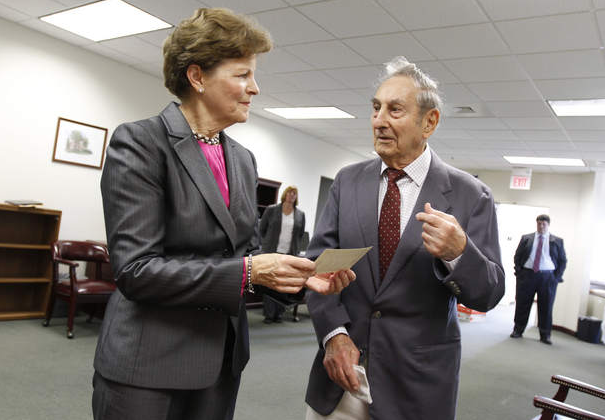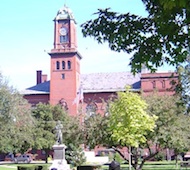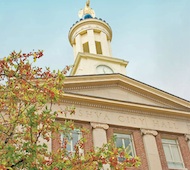As combat medals are presented to Nashua vet, not all World War II memories are sad
By David Brooks
September 28, 2012
MANCHESTER – Like a lot of war veterans, Martin Mehron has some bad memories from his time overseas, starting with the food.
"The food was terrible. It was pretty good onboard ship, unless they ran out … but on land, it was terrible," said the longtime Nashua resident and former Sanders Associates engineer.
He was speaking at a Thursday morning presentation of medals that he never received for his service as a World War II Navy airman in the Philippines while it was being freed from Japanese occupation.
The medals included the Presidential Unit Citation, a citation for an entire unit that is considered the equivalent of the Navy Cross for individuals.
As Mehron told it, the powdered eggs and canned rations fed to air crews between missions were so lousy that his unit finally swapped some clothes and bedsheets for a pair of chickens from a local family. The aircrew anticipated a feast, but Mehron, a radar engineer who had been appointed cook, knew something was wrong when boys in the family tossed the birds in the air and they started battling each other.
"They weren't hens, they were fighting cocks," he said, laughing at the memory. "I cooked them and cooked them, but they were so tough. … I gave away the chicken and ate the livers."
That story was one of many that came out during the ceremony Thursday in the Manchester office of U.S. Sen. Jeanne Shaheen, D-N.H., who hosted the presentation – "one of the best parts of this job," she said.
Among those present were three of Mehron's five children, who said that they had never heard stories about their father's World War II days until recently.
"He never said anything about it when we were younger," said Margaret Sanford, of Mont Vernon, one of Mehron's daughters. Son James Mehron, of Nashua, and daughter Kathy Kayros, of Bow, also attended.
It was only after Mehron's wife, Helen, died a few years ago and he found out about reunions of Navy air veterans that he began to reminisce, they said.
Why did Mehron, like so many war veterans, never talk about the experiences?
"I don't know why," he said. "I guess because there are so many sad stories. I like to tell the funny stories; there are too many sad ones."
Among the sad stories is the crash of the B-24 bomber that ended his combat days. The plane fell into Leyte Harbor 300 feet short of land when it ran out of fuel, just before midnight on New Year's Eve 1944. The co-pilot was killed, and many other members of the 12-member crew were badly injured. But Mehron has a funny story about that, too.
"I woke up and there were people kneeling around my bed. I thought I'd died and gone to heaven. Then I realized that they'd put me in the (hospital) cathedral. New Year's Day was a fast day and everybody was praying."
Deciding he felt OK, he checked himself out of the hospital and walked back to the base, only to be informed by an officer consulting an official list that he couldn't return because was dead.
"It's a good thing they were wrong," said Shaheen.
Mehron, 89, was born in New Jersey and enlisted in the Navy at age 19. Because he had gone to vocational-technical high school, he was sent to radar school to learn about this brand-new, and top secret, technology. He trained as a radarman in beat-up planes he called "war wearies."
"They had four engines. You'd go up to 500 feet, one of the engines would go out, then you'd turn around to land and another one would go out. We had lots of practice dealing with engines going out," he said.
When the new B-24s arrived they headed to the Pacific theater. Mehron's unit was the lead unit when the U.S. retook the Philippines, making good on Douglas MacArthur's famous "I will return" pledge. Eventually, he said, the unit produced five of the eight Navy aces in the Pacific theater.
Mehron was radarman in the bomber for hundreds of hours of flights throughout the western Pacific, patrolling for Japanese ships, bombing the enemy, trying to lure Japanese fighter planes so they could be shot up by the B-24's eight .50 caliber machine guns.
After the crash ended his fighting days, Mehron got an engineering degree. Eventually he was hired by Sanders Associates, now BAE System's Electronic Systems division. He moved the family to Nashua in 1959 and never left.
The Navy medals were presented in Shaheen's office by senior chief machinist's mate Dan Clark of the Naval Operations Support Center in Manchester. They include medals for the Asiatic-Pacific Campaign, the American Campaign, World War II Victory Medal, and the honorable service lapel pin, usually called "the ruptured duck" because of the design of its eagle.
The medals were uncovered by Shaheen staffer Bethany Yurek, after Mehron queried the office. Like many veterans, he was looking ahead when the war ended and hadn't bothered about them at the time.
"We have a fair number of World War II veterans that reach out to us," Yurek said. "They usually want to see if they can have something for their children or their grandchildren."
###













